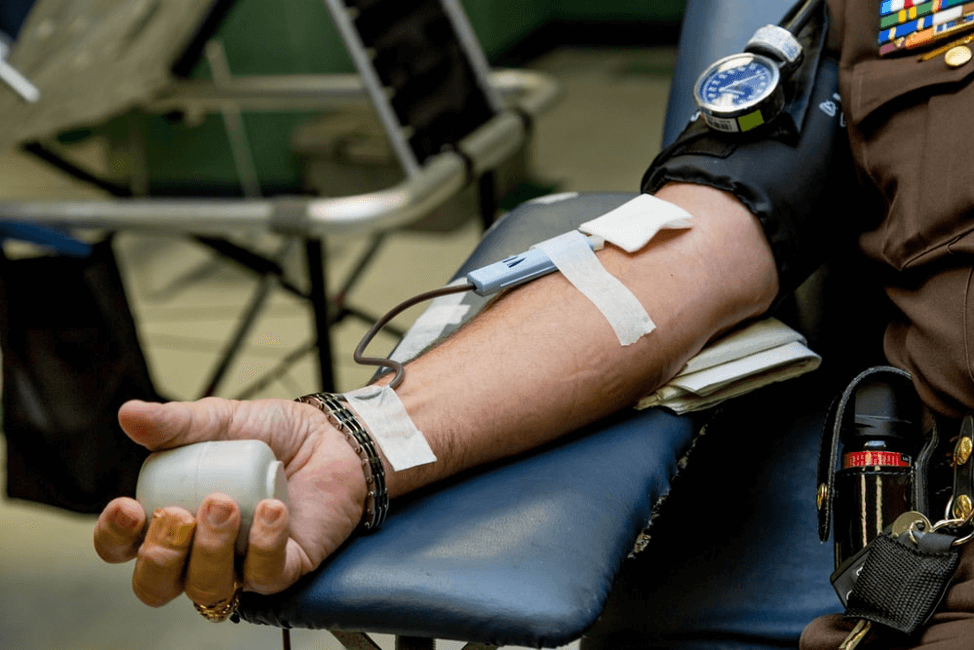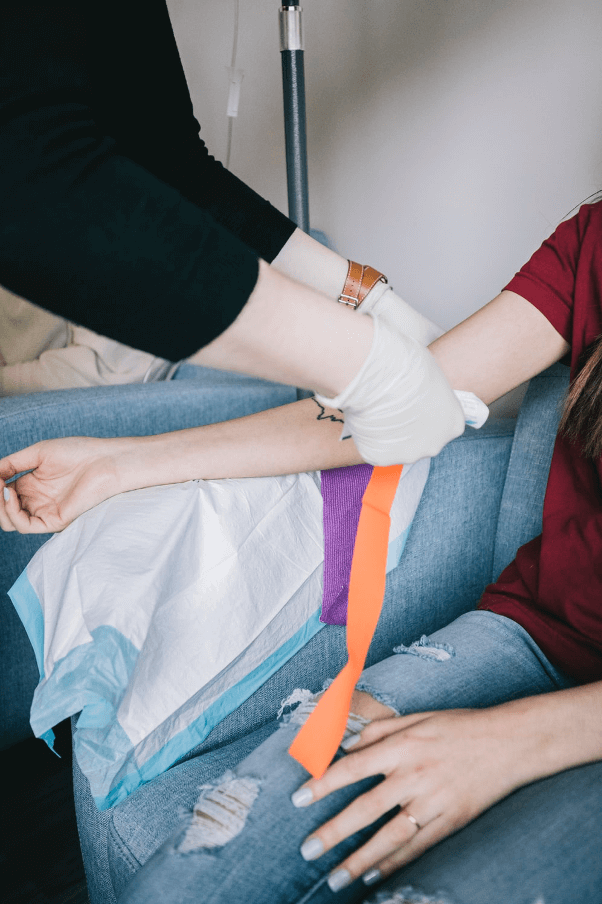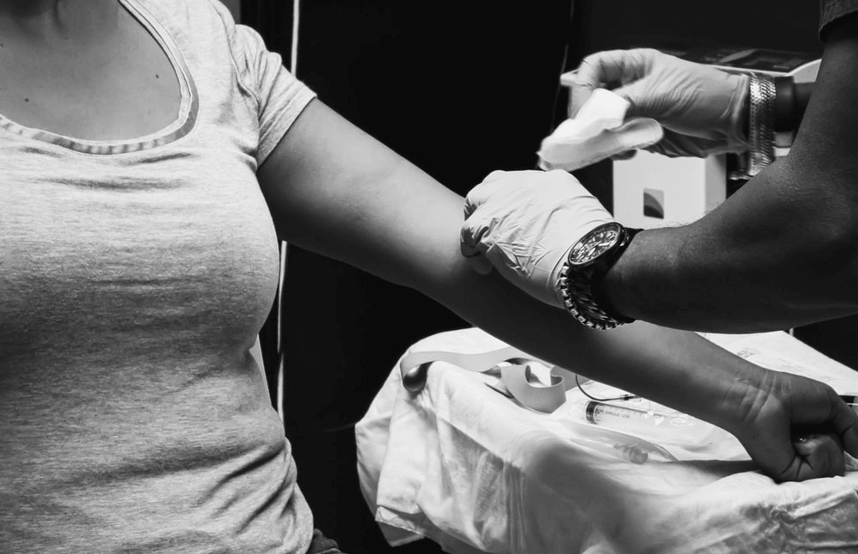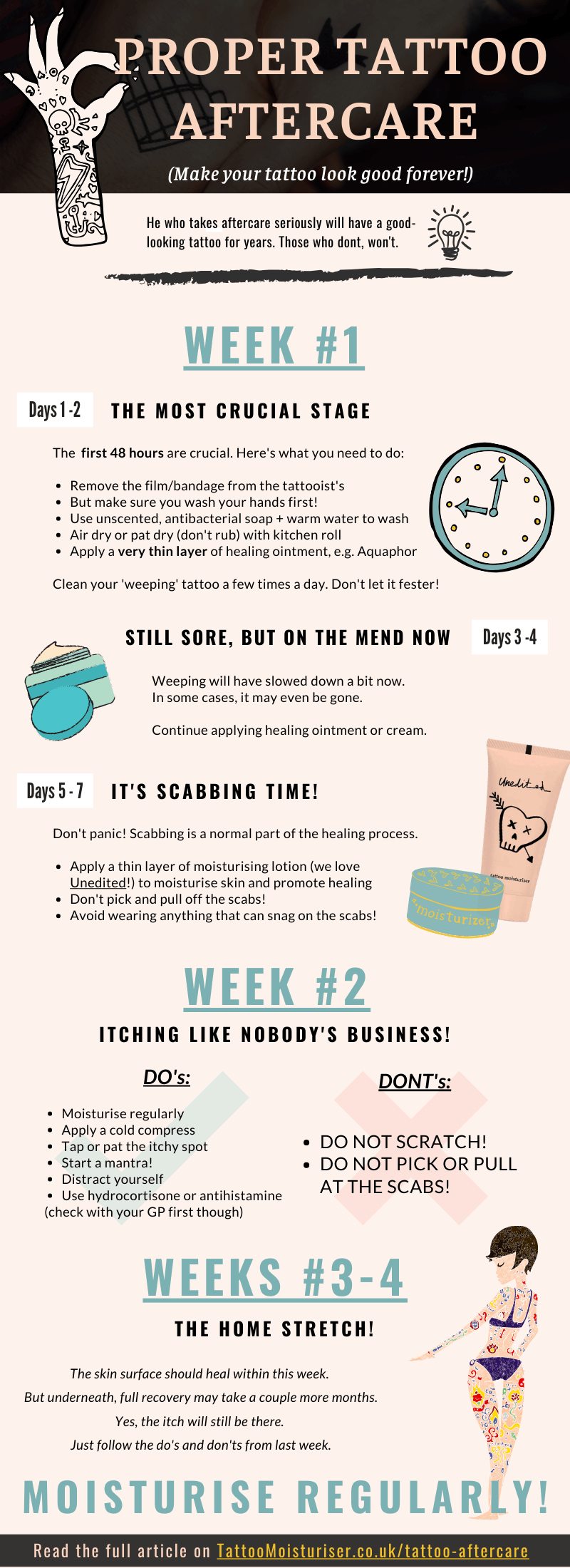It’s not just vampires who need blood in order to survive (if they exist). Us humans need blood, too. In fact, millions of people need blood for important, life-saving reasons – surgeries, illnesses, traumatic injuries, cancer treatment, and more. It’s therefore not surprising that blood is considered life. When you donate blood, you literally give life. But how does blood donation work if you’re tattooed? Read on to find out!
Page Contents
Who can give blood?

In a perfect world, everyone capable and healthy can give blood. But this isn’t the case obviously. There needs to be certain criteria in place to ensure the safety of recipients. These requirements will vary from country to country, but here in the UK, here’s who can donate:
- Age: Between 17 and 66 (up to 70 if you’ve given blood before). If you’re over 70 and have donated blood in the past 2 years, you’re also eligible.
- Weight: Between 50kg and 158kg
- Generally fit and healthy
- Other conditions:
- If you just got a tattoo / body piercing / non-medical injection, you need to wait at least 4 months before donating blood (scroll down to know why).
- If you’ve got a cold, you can’t donate. Wait for it to clear up first.
- If you’re feeling under the weather, get some rest to get better.
- If you have an infection (and taking antibiotics for it), wait at least 14 days before giving blood.
- If you’re pregnant, you can’t give blood (you and your baby need it).
- You can donate blood after 24 hours if you had a simple dental treatment. Otherwise, you need to wait up to 14 days (or more).
For a more comprehensive list on who can donate blood, please visit https://www.blood.co.uk/.
So, people with old tattoos can give blood, yes?
Yes, if your tattoo is more than 4 months old, you can give blood. However, you can only do so if you got inked by a licensed tattooist.
If you got tattooed by a scratcher or you had a stick and poke tattoo done by a friend at home, then it’s best to wait at least a year before donating blood.
But why the discrepancy in waiting times?
Well, if you got inked by a licenced tattooist, then it is assumed that proper sanitation is observed in the premises. This is one of the key requirements for local councils to approve a tattooist for business.
To get a tattoo licence, the shop or parlour will be evaluated and inspected first to ensure all stringent requirements are met, and that clients’ health won’t be compromised. Only then can they get a licence to operate their business.
Now, if you got inked by a scratcher or a non-licensed, wannabe tattooist, then it’s a different story altogether. Scratchers tend to work in less than ideal, unsanitary environments. Sure, some of them may be skilled and talented. But that won’t mean a thing if you contract a tattoo infection. Or worse, a bloodborne disease like hepatitis B, hepatitis C, MRSA, and even HIV!
Tattooing isn’t just about sticking needles in someone’s skin, it’s technically a minor medical operation. Blood-borne pathogens certainly aren’t a joke, so work with someone who’s actually licenced to do the job.
The waiting time serves an important purpose…
It allows the body to produce antibodies, so that diseases can be identified. Antibodies take time to produce, so if you contracted an infection a week ago, it won’t show up immediately on blood tests. It’s important for your blood to be free of bloodborne diseases. You’re donating to save lives, not put anyone in harm’s way!
That said, always choose to work with a licenced tattooist. The risks are significantly reduced, and you get to donate life-saving blood in just 4 short months!
Disclaimer:
The 4-month waiting period applies to the UK. For other locations, please check with your local authorities to find out how soon AFTER getting a tattoo you can donate blood. Some countries/states/provinces require longer periods (6 months to 1 year). Others are able to donate a day or two later (in places which regulate tattoo shops).
Can you donate blood BEFORE getting a tattoo?

It’s possible to donate blood before you get a tattoo, as long it’s not on the same day. This is because you may feel faint or lightheaded after donating. And seeing how painful tattooing can be, you need all your strength to withstand the pain.
Allow your body to recover from your good deed first, before embarking on your next endeavour. This may take a day or two, or however long you need to recuperate from the blood loss.
Here’s what you can do to help your body recover and prepare for your upcoming tattoo appointment:
- Eat well and get a good night’s sleep
Blood donation can take maybe 30-45 minutes. But it can be physically exhausting. You may feel weak and dizzy, so grab a healthy snack and drink water afterwards. Then get at least 6-8 hours of sleep to help your body recover.
- Drink plenty of fluids for the next few days
You just lost a lot of fluid (in the form of blood). To avoid dehydration, you should drink plenty of water and/or sports drinks like Gatorade to replace electrolytes in your body.
- Avoid going to the gym and/or exercising
For the gym bunnies out there, surely, a day or two of rest won’t kill you. But strenuous physical activity might. After donating, it’s best to get plenty of rest. Don’t forget you still need to prepare your body for your tattooing session.
- Avoid taking blood thinning medication
This includes aspirin or ibuprofen. Doing so may cause issues with your tattoo healing properly.
- Avoid drinking alcohol
Alcohol thins the blood. If you do have a tattoo the following day, it’s best to avoid drinking any alcoholic drinks.
If you still feel light-headed even after getting some rest, and you feel unwell the day after giving blood, you may be coming down with something. If so, speak with your GP and reschedule your tattoo appointment to a later date.
Why become a donor: Benefits of donating blood

By now, you already know that giving blood can save lives. If everyone healthy were to donate blood regularly, we’d have sufficient supply in blood banks everywhere. Anyone who needs blood won’t ever need to go into panic mode, and can focus on their recovery instead.
But what about you? As a donor, do you get anything in return for your benevolent act?
The answer is yes, you do get a lot of benefit in return! Here are some of them:
- Lowers your iron levels
Iron is important to the body. If you’re low in iron, you’re anaemic. If you’ve got too much iron, you may have hemochromatosis (more men suffer this condition, probably because females lose blood through menstruation). It’s therefore important to have just the right amount of iron in blood. And one way to maintain healthy levels of iron in blood is by donating blood regularly.
- Reduce the risk of heart attack
According to this study, blood donation can lower the risk of myocardial infarction or heart attack. People who have high levels of iron in their blood are especially at risk of heart failure and disease.
- Reduce the risk of cancer
Too much iron can accelerate the growth of tumours. High levels of iron is associated with a 25% increase in risk of getting cancer. It is therefore important to reduce iron levels in blood – and donating blood will certainly help you achieve this goal.
- Replenish blood
Women menstruate and regularly replenish blood. Men, however, don’t. So, if you’ve got high iron levels in blood, it’s best to give blood if you can.
- Feel good about yourself
Knowing you’re helping someone is a powerful mood booster! I’ve personally donated blood several times over the years, and I always feel good afterwards. You may not know the recipient personally, but the knowledge that you’re making a difference in a life-and-death situation feels wonderful.
So, how often can you donate blood?
Lovin’ the health benefits of blood donation and thinking of donating frequently? Well, that’s great news! The more you donate, the more people get the blood they need! So, how often can you donate?
- If you get tattooed frequently, you can donate 4 months after your last tattoo.
- For men, you can donate every 3 months (there’s a shorter recovery period between donations because men have more haemoglobin).
- Women, on the other hand, can donate every 4 months (girls menstruate so there needs to be some leeway for haemoglobin levels to go back to normal).
What to look for to ensure you get a ‘sanitary’ tattoo

Keep these tips in mind if you want to ensure you get a safe tattoo, so you can continue (or start) donating blood after 4 months!
- Verify the tattooing licence
Professionally-done tattoos cost more money than a DIY tattoo or scratcher tattoo. And it’s understandable why. You’re paying for their skills, their experience, and their sanitary practices to protect you from infection and disease.
In the UK, tattooists are advised to display their licence or certificate in a prominent part of the shop (this is usually in the reception area). Failure to do so may result in a council fine or penalty.
- Make sure the place is clean, especially the tattooist’s working area
Do an ocular inspection of the tattoo shop you plan on getting tattooed at. Schedule a visit before your appointment and ask the tattooist if you can sit in and observe. Here are some things you should watch out for:
Do you see a sharps box?
It’s where tattooists dispose their single-use needles and cartridges after every session. If the artist throws their needles into a regular trash bin, then that’s a big no-no.
Does the artist cover up the entire working area with plastic wrap, including their tattoo machine?
It’s easy for cross-contamination to occur if they don’t. Blood and other bodily fluids can easily splash onto various surfaces. It’s important to make sure the artist replaces the wraps after each session.
Does the artist use disposable gloves?
It would be so unsanitary if he/she didn’t! And make sure that those gloves stay on, they don’t touch uncovered and unprotected surfaces. Otherwise, that defeats the purpose of wearing gloves in the first place, right?
Ensure the artist does not use recycled tattooing equipment
Some tattoo parlours use autoclaves to sterilise their tattooing equipment. But nowadays, it’s more practical to just use single-use needles. Check that the needles, tattoo ink, and gloves aren’t reused, and are used straight from the packaging.
- Follow proper aftercare
You’ve got 4 months to wait from the moment you get inked until you can finally donate blood. Your tattoo will be fully healed by then. In fact, if you carefully follow aftercare instructions, your tattoo should heal up within 3-4 weeks. Here’s an infographic to give you an idea of what goes on during aftercare:

Related article: Tattoo Etiquette: The 12 Do’s and Don’ts of Getting a Tattoo
Conclusion
You can still donate blood even if you’ve got a tattoo. As long as you meet the donor criteria, and clear the 4-month waiting period, then blood donation should be on your to-do list. You’ll not only save lives, you’ll also reap plenty of health benefits, too!
